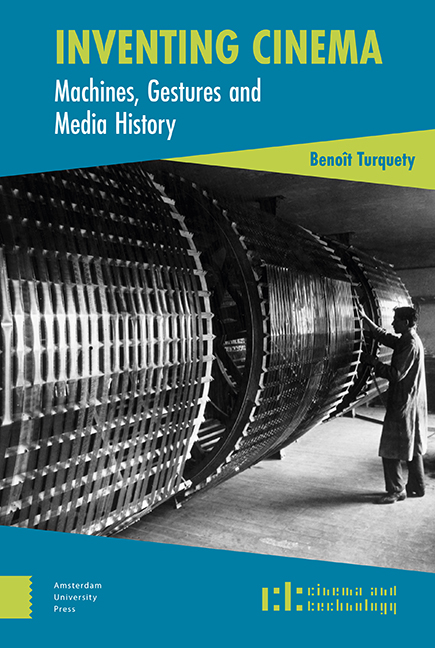Book contents
- Frontmatter
- Dedication
- Contents
- Acknowledgements
- Introduction: The Problems of Digital Cinema
- 1 The Why and How of Machines
- 2 Invention, Innovation, History
- 3 The Invention of the Problem
- 4 The Invention of the Cinématographe
- 5 ‘Natural Colour Kinematography’, a New Cinema Invention : Kinemacolor, Technical Network and Commercial Policies
- 6 Epilogue: From the Trembling of Film to the Stability of the Digital
- Bibliography
- Index
3 - The Invention of the Problem
Published online by Cambridge University Press: 21 November 2020
- Frontmatter
- Dedication
- Contents
- Acknowledgements
- Introduction: The Problems of Digital Cinema
- 1 The Why and How of Machines
- 2 Invention, Innovation, History
- 3 The Invention of the Problem
- 4 The Invention of the Cinématographe
- 5 ‘Natural Colour Kinematography’, a New Cinema Invention : Kinemacolor, Technical Network and Commercial Policies
- 6 Epilogue: From the Trembling of Film to the Stability of the Digital
- Bibliography
- Index
Summary
Abstract
The epistemological approach to film technology is further developed through the study of a key moment: the first patents and projects describing some sort of ‘cinema’ machines as early as the 1860s. Discussing the place of these within media historiography (Sadoul, Bazin, Frizot, etc.), two of these apparatuses are analysed in their context with the greatest possible precision. Approached through the combined perspectives of Simondon, Bachelard, and Canguilhem, they allow the construction of the concept of ‘problem’, which is central to an epistemology of machines.
Keywords: Invention, media history, Gilbert Simondon, Gaston Bachelard, Charles Cros, Louis Ducos du Hauron.
The Idea and the Question of Origins: André Bazin as Historiographer
‘The Myth of Total Cinema’ constitutes André Bazin's incursion into the writing of film history and historiographical methodology. I refer to the 1958 version of the essay included in What is Cinema?, not the original article published in Critique in 1946, entitled ‘The Myth of Total Cinema and the Origins of the Cinématographe’. The 1946 book review was radically different from the rewritten text of 1958: in 1946, Bazin more timidly stuck to writing an interesting but often approximate summary of the book he was reviewing by Georges Sadoul, in the end forming his own hypothesis only unobtrusively. Relations between the critic Bazin and the historian Sadoul were quite simply more respectful in 1946 than they were twelve years later, when Bazin extensively revised the text. In that version, the historiographical criticism absent in 1946 revealed the more complex relations between the men in 1958.
Placed by Bazin right after ‘Ontology of the Photographic Image’ in the first volume of his ‘summa’, ‘The Myth of Total Cinema’ appears to the reader as the historicized – and amused – pendant to the theoretical, ahistorical, anthropological, and highly serious opening text. The article is certainly among the better known of Bazin's texts, whose principal argument can be summarized by this remark:
The guiding myth of the invention of cinema is thus that it will accomplish the dominant myth of every nineteenth-century technique for reproducing reality, from photography to the phonograph: a complete realism, the recreation of the world in its own image – an image upon which the irreversibility of time and the artist's interpretation do not weigh.
- Type
- Chapter
- Information
- Inventing CinemaMachines, Gestures and Media History, pp. 103 - 150Publisher: Amsterdam University PressPrint publication year: 2019



